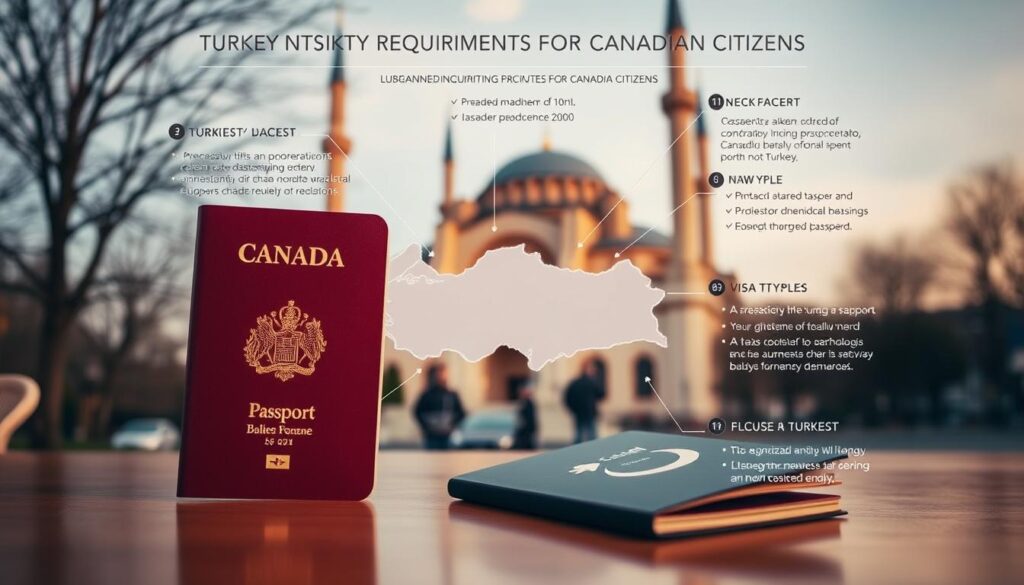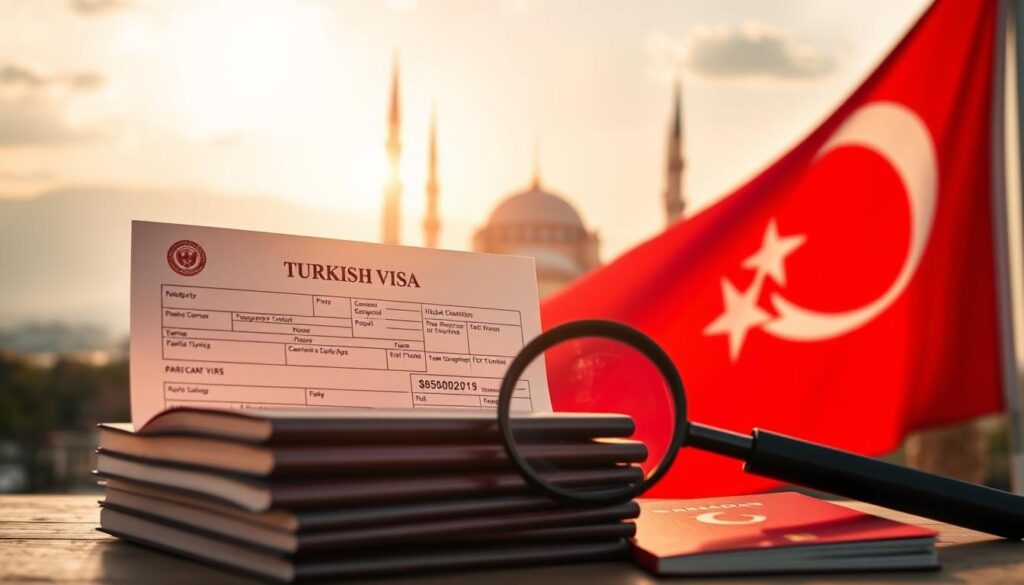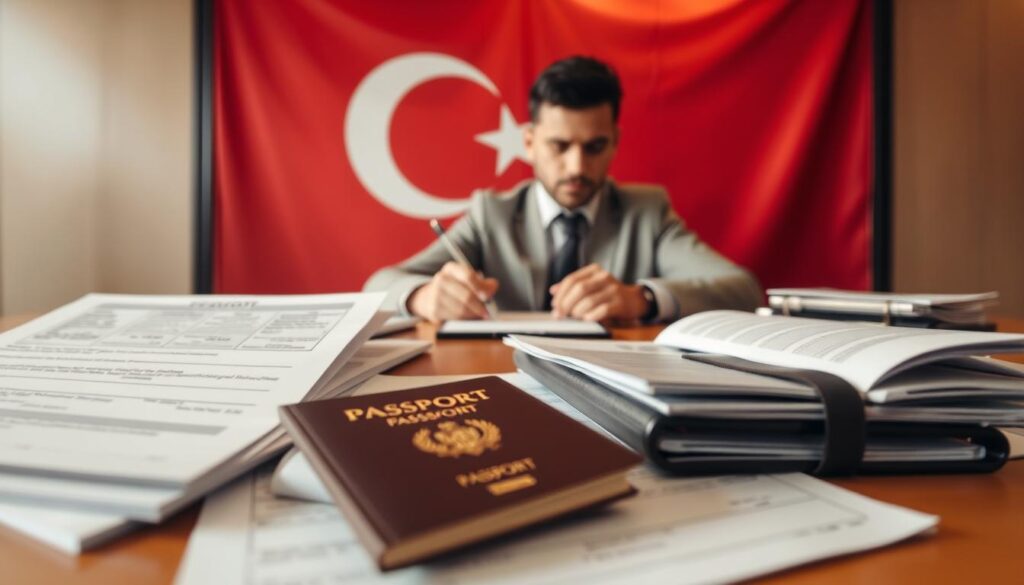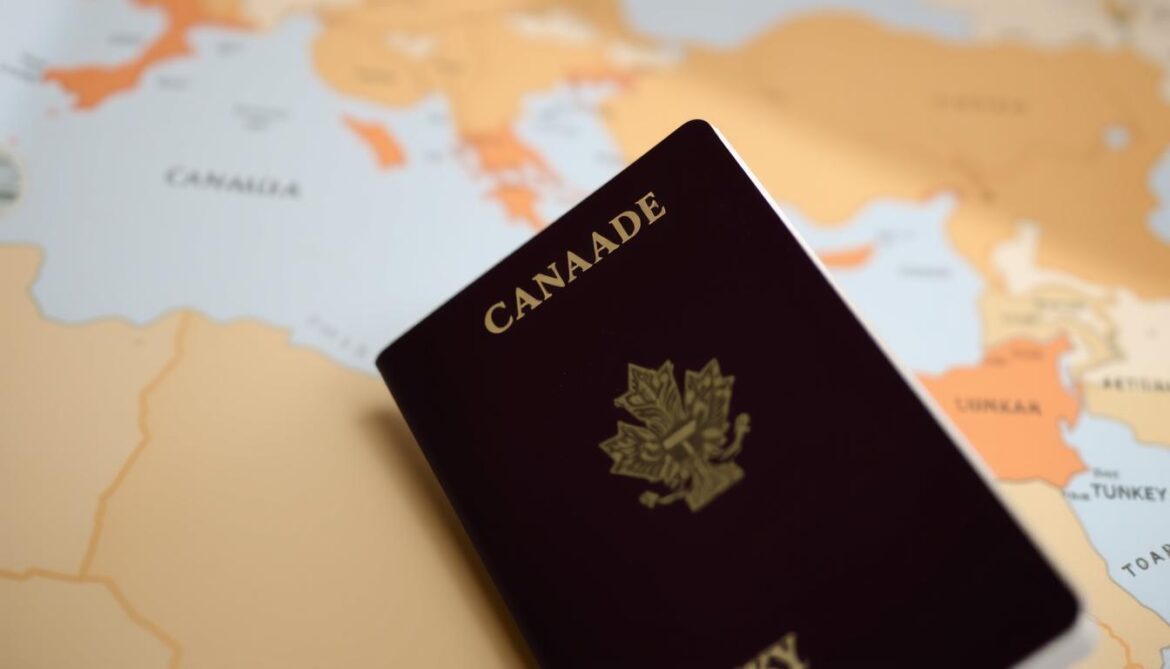Over 200,000 Canadian travellers visited Türkiye last year—and nearly all entered without a visa. Recent policy changes mean your passport now unlocks streamlined access to this transcontinental destination. According to Türkiye’s Electronic Visa Application System, short-term tourism visits under 90 days no longer require advance applications for eligible visitors.
Your journey begins with verifying your passport’s validity. The document must remain current for at least six months beyond your arrival date. This requirement ensures smooth entry through Turkish border controls while aligning with international travel standards.
The Canada Visa Portal simplifies trip planning by consolidating critical updates and entry guidelines. Our platform delivers real-time information about documentation, safety protocols, and cultural considerations specific to Canadian travellers. Whether exploring Istanbul’s Grand Bazaar or Cappadocia’s lunar landscapes, you’ll find tailored resources to enhance your experience.
Turkey’s visa exemption policy reflects growing diplomatic ties between the two nations. This arrangement eliminates bureaucratic hurdles, allowing spontaneous adventures without lengthy processing times. Always confirm entry requirements before departure, as regulations may evolve with global conditions.
Key Takeaways
- Visa-free access applies to tourism stays under 90 days
- Passports require six months’ validity post-arrival
- Updated travel advisories available through official portals
- Exemption policies enable last-minute trip planning
- Comprehensive guidance simplifies documentation checks
Overview of Turkey Entry Requirements for Canadian Citizens
Turkey’s role as a cultural crossroads and growing economic partner makes it a standout travel destination. Straddling two continents, the country blends ancient wonders with modern conveniences, attracting visitors seeking both adventure and business prospects.

Why Turkey Stands Out for Travellers
Historic landmarks like Ephesus and Pamukkale’s thermal pools draw culture enthusiasts. Urban hubs such as Istanbul merge vibrant markets with thriving tech startups. Trade ties between the nations hit $3 billion recently, creating opportunities beyond tourism.
Efficient airports and high-speed rail networks simplify exploring diverse regions. Coastal resorts along the Aegean Sea contrast with Cappadocia’s lunar valleys, offering something for every itinerary.
Navigating Border Protocols
Canadian citizens enjoy visa-free entry for stays under 90 days. Ensure your passport remains valid for six months post-arrival. Border officials may request proof of accommodation or return flights.
Currency restrictions require declaring amounts over $10,000 USD equivalent. Familiarize yourself with customs rules regarding electronics and cultural artifacts. These entry requirements help maintain smooth transitions for short-term visits.
Always verify the latest travel advisories through official channels. This information ensures compliance with evolving health and security measures in the country.
do canadians need a visa for turkey?
Exploring Turkey’s vibrant markets and ancient ruins just became simpler for leisure visitors from North America. Recent agreements grant hassle-free access for short trips, though specific rules determine when formal permissions become necessary.

Visa Exemption for Short-Term Tourism
Your passport unlocks 90-day stays within any 180-day window for recreational travel. This exemption covers guided tours, family visits, and cultural exploration. No advance paperwork required – border officials stamp your document upon arrival.
Return visits demand careful timing. You must spend three months outside Türkiye before re-entering under this policy. This prevents consecutive stays exceeding permitted limits.
When a Visa Application is Required
Formal documentation becomes essential for non-tourism activities. Paid work assignments, academic research, or volunteer projects all require embassy-approved permits. Processing typically takes 15 business days.
| Situation | Exemption Applies? | Action Required |
|---|---|---|
| Business meetings | No | Apply for work permit |
| Language courses | Yes (under 90 days) | None |
| Journalism projects | No | Secure media visa |
| Archaeological tours | Yes | Carry invitation letter |
Overstaying triggers immediate consequences. Authorities may impose €100 daily fines or entry bans lasting up to five years. Always track your departure date using digital calendar alerts.
Documents Required for Your Turkey Trip
Preparing the right paperwork transforms border crossings from stressful to seamless. The Canada Visa Portal consolidates every requirement to ensure your Turkish adventure starts without delays.
Valid Canadian Passport Criteria
Your valid Canadian passport acts as your golden ticket. Authorities mandate it remains valid for at least 60 days after your planned exit date. Many experts suggest extending this buffer to 150 days for guaranteed compliance.
Inspect your document’s physical condition thoroughly. Scuffed covers or torn pages could raise concerns. Ensure two blank pages exist for entry stamps and verify the machine-readable zone functions properly.
Additional Essential Documents
Border agents often request proof of accommodation and return flight confirmations. Maintain digital and printed copies of hotel bookings or host invitations. Financial proof showing ₺500 daily (about $30 CAD) helps demonstrate self-sufficiency.
Organize these travel documents in a dedicated folder for quick access. Include travel insurance covering medical emergencies and a detailed itinerary. Smart travellers keep emergency contacts and embassy details within easy reach throughout their journey.
Understanding the Turkish E-Visa Policy
Turkey’s digital visa system offers flexibility for visitors requiring extended stays or specialized permits. While leisure trips under 90 days remain visa-free, the e-visa platform streamlines access for other purposes like business engagements or academic research.

Eligibility and Application Process
Qualifying for an e-visa takes minutes through Turkey’s official government portal. Complete the online form with passport details and travel dates. Payment confirmation unlocks immediate electronic delivery.
Processing typically completes within 48 hours. The system automatically checks eligibility criteria, including passport validity and previous entry records. Always verify your permit type matches your activities – tourism exemptions don’t cover paid work.
Comparing E-Visa and Embassy Applications
Two distinct pathways exist for obtaining travel authorization. The table below clarifies key differences:
| Feature | E-Visa | Embassy Process |
|---|---|---|
| Processing Time | 1-2 days | 15+ business days |
| Cost | $60 USD | $85-$220 CAD |
| Documentation | Digital submission | In-person interviews |
| Permit Duration | Up to 90 days | 6-12 months |
Third-party services often charge 300% markups for unnecessary “assistance”. Bookmark Turkey’s official .gov.tr sites to avoid scams. The Turkish Embassy in Ottawa handles complex cases like student visas or residency permits requiring physical document verification.
Remember: E-visas work best for short-term professional visits. Extended research projects or employment contracts demand embassy-approved permits with stricter financial proof requirements. Match your application method to your trip’s purpose for optimal results.
Alternative Visa Options for Work and Study
Expanding your professional or academic horizons in Türkiye requires careful preparation beyond standard tourist entry. Specialized permits ensure compliance with local regulations while protecting your legal status during extended stays.

Work Visa Requirements and Procedures
Securing employment authorization demands coordination with the Turkish Embassy in Ottawa. You’ll submit an employment contract, employer sponsorship letter, and certified copies of professional credentials. Medical examinations and police clearance certificates add 2-3 weeks to processing timelines.
Approval typically takes 4-6 weeks. Successful applicants receive a work permit valid for one year, renewable through the same embassy channels. Remote workers qualify for a Digital Nomad visa through Türkiye’s dedicated online portal, requiring proof of $3,000 USD monthly income.
Study Visa Application Tips
Educational pursuits begin with an acceptance letter from a recognized Turkish institution. Financial documents must show ₺1,500 monthly (about $70 CAD) for living expenses. Language proficiency tests may apply depending on your program’s requirements.
Submit applications eight weeks before departure to accommodate embassy processing. Unlike tourist entry, study permits require in-person interviews and academic transcripts. Exchange students often benefit from accelerated approval when programs have government partnerships.
Both work and study visas mandate completion before arrival. The Canada Visa Portal streamlines document checklists and embassy contact details, ensuring you meet all criteria for lawful entry and residency.
Step-by-Step Guide to the Visa Application Process
Navigating Turkey’s entry requirements becomes straightforward when you understand the official procedures. This guide simplifies obtaining travel authorization through verified channels, ensuring compliance with current regulations.

Online Application Walkthrough
Start by visiting Turkey’s official e-visa portal. Complete the digital form with precise passport details and trip dates. Double-check entries to avoid delays caused by typos or mismatched information.
Upload required documents like passport scans and accommodation confirmations. Payment through secure government channels finalizes your submission. Most applicants receive approval within 48 hours via email.
Submission and Follow-Up Guidelines
Track your application status using the reference number provided during submission. Processing timelines vary:
- Standard requests: 2-5 business days
- Complex cases: 10-15 business days
Some situations require embassy involvement. You might need to schedule appointments for document verification or interviews. Book these early to align with your departure plans.
Always use government websites for submissions. Third-party services often charge excessive fees for basic procedures you can complete independently. Save confirmation emails and print copies as backup proof of authorization.
Factor in potential processing delays when organizing your itinerary. Submitting applications 4-6 weeks before travel provides buffer time for unexpected requests. The Canada Visa Portal offers real-time updates on policy changes affecting approval timelines.
Navigating the Turkish Embassy in Ottawa
Extended stays or specialized travel purposes require direct engagement with Türkiye’s diplomatic representatives. The Turkish Embassy in Ottawa handles all non-tourism visa requests, including work permits and residency applications. Prepare for a structured process with clear documentation requirements and scheduled interactions.
Appointment Scheduling and Interviews
Book embassy appointments at least six weeks before your planned departure. Peak seasons like summer see high demand, causing limited availability. Use the embassy’s online portal for initial submissions – this reduces in-person visits for routine queries.
Interviews focus on verifying your travel intent and financial capacity. Bring original documents like employment contracts or university acceptance letters. Officers often ask about accommodation plans and return flight details to confirm compliance with visa terms.
Complex cases may require multiple appointments. Study permits typically demand academic transcripts and language test results. Work visas need employer sponsorship letters and certified translations of professional licenses. Organize paperwork in labeled folders to streamline each interaction.
Processing timelines vary significantly:
- Standard tourist extensions: 10 business days
- Work permits: 4-6 weeks
- Residency applications: 8-12 weeks
Track applications through embassy reference numbers and follow up via official channels. Avoid third-party services – direct communication ensures accurate updates. The Canada Visa Portal provides embassy contact details and real-time processing estimates to help plan your schedule.
Health and Safety Considerations for Your Journey
Staying informed transforms potential risks into manageable situations during international trips. The Canada Visa Portal prioritizes your well-being with real-time updates tailored to Türkiye’s evolving conditions.
Updated Travel Health Notices
Current advisories highlight increased political demonstrations since March 2025, particularly in Istanbul. Large gatherings may result in sudden road closures or transit delays. Monitor official channels for protest locations and alternative routes.
Your travel insurance must cover emergency medical evacuation and trip interruptions. Verify policies include hospitalization costs and political unrest clauses. Many providers offer 24/7 assistance lines for urgent situations abroad.
Local Emergency Procedures
Save critical contacts before departure:
- Police: 155
- Medical: 112
- Canadian Embassy: +90 312 409 2700
Avoid crowded markets and transit hubs during peak time slots. Recent security alerts note possible terrorism threats in urban centers. Stay alert in areas with visible police presence or security checkpoints.
Health preparations require updated routine vaccinations and COVID-19 boosters. Carry prescription medications in original packaging with doctor’s notes. Local pharmacies stock common remedies, but language barriers may result in communication challenges.
Understanding Local Laws and Cultural Expectations
Respecting regional norms ensures your adventures remain memorable for the right reasons. Turkey blends modern governance with deep-rooted traditions, creating unique social dynamics. A little preparation helps avoid unintended offenses while exploring this crossroads of civilizations.
Customs Regulations and Legal Requirements
Declare restricted items like prescription medications upon arrival. The country prohibits importing antiquities or historical artifacts without permits. Currency declarations apply if carrying over €10,000 equivalent.
Dress modestly when visiting mosques or rural areas. Shoulders and knees should stay covered in religious sites. Public displays of affection draw unwanted attention in conservative regions.
Photography restrictions exist near military installations. Always ask permission before snapping portraits of locals. Alcohol sales stop after 10 PM in many cities – plan evening travel accordingly.
Understanding these rules protects you from fines or legal issues. Carry embassy contact details and review the country’s latest advisories before finalizing travel plans. Cultural awareness transforms potential missteps into meaningful exchanges.



